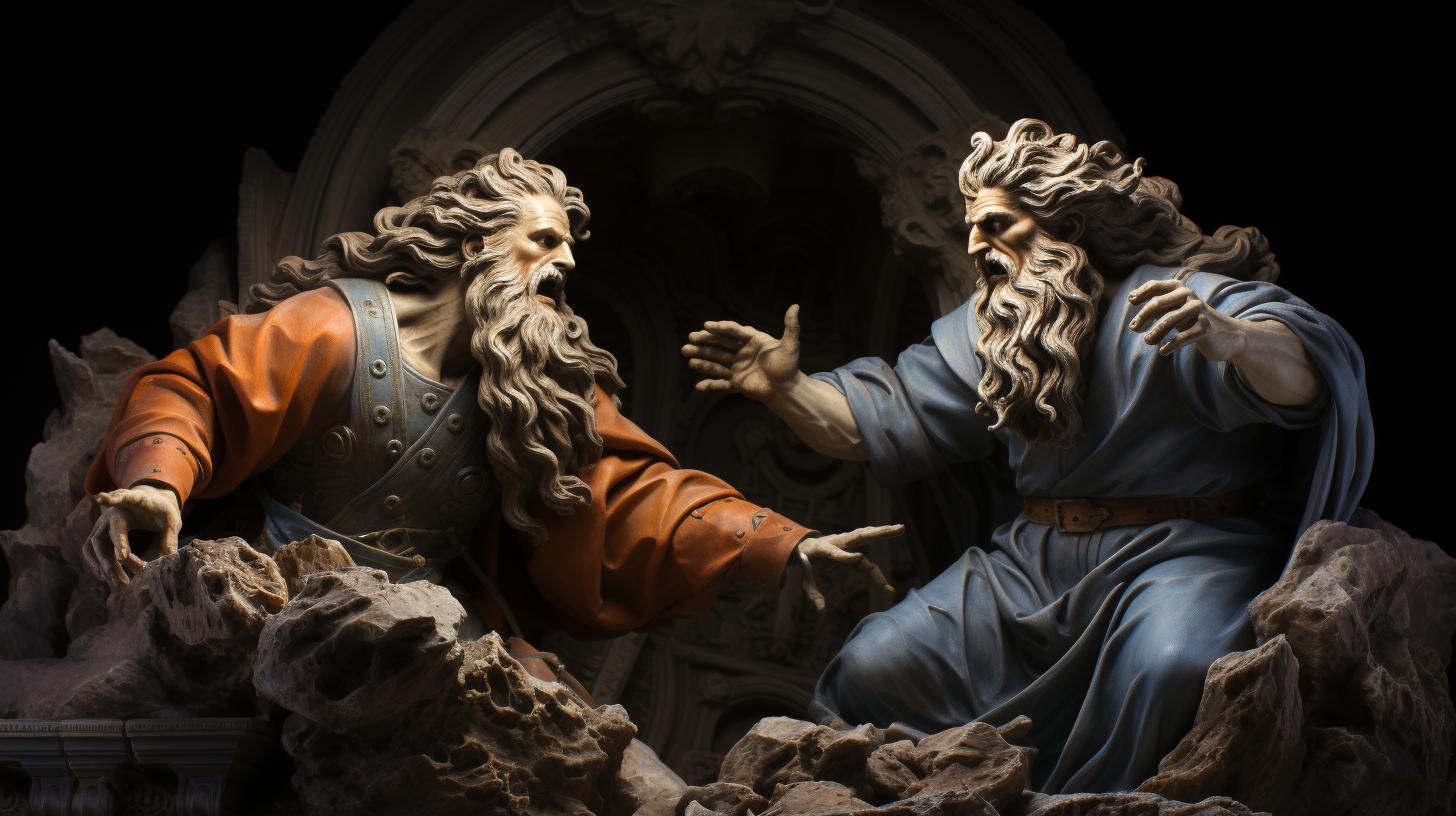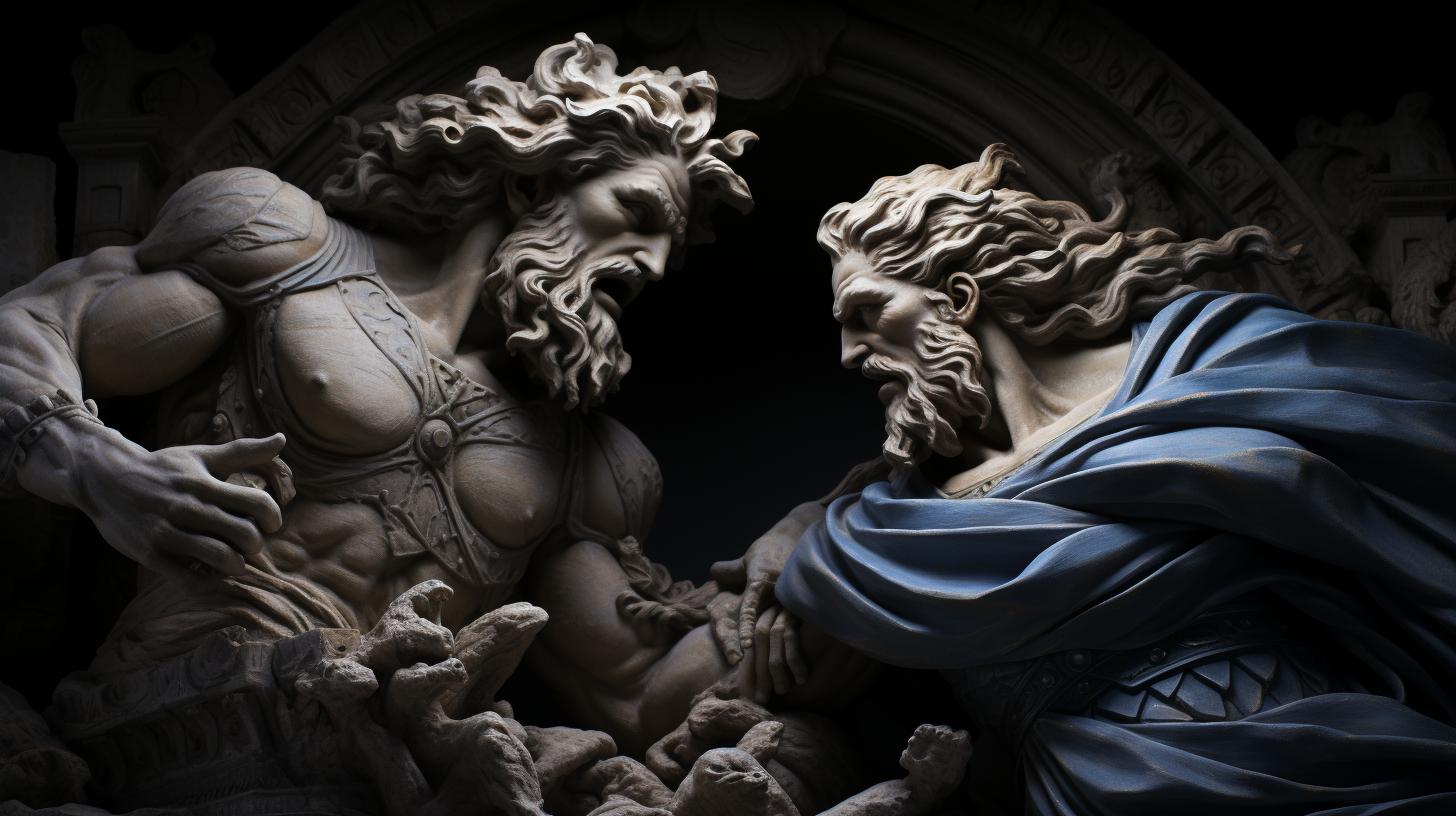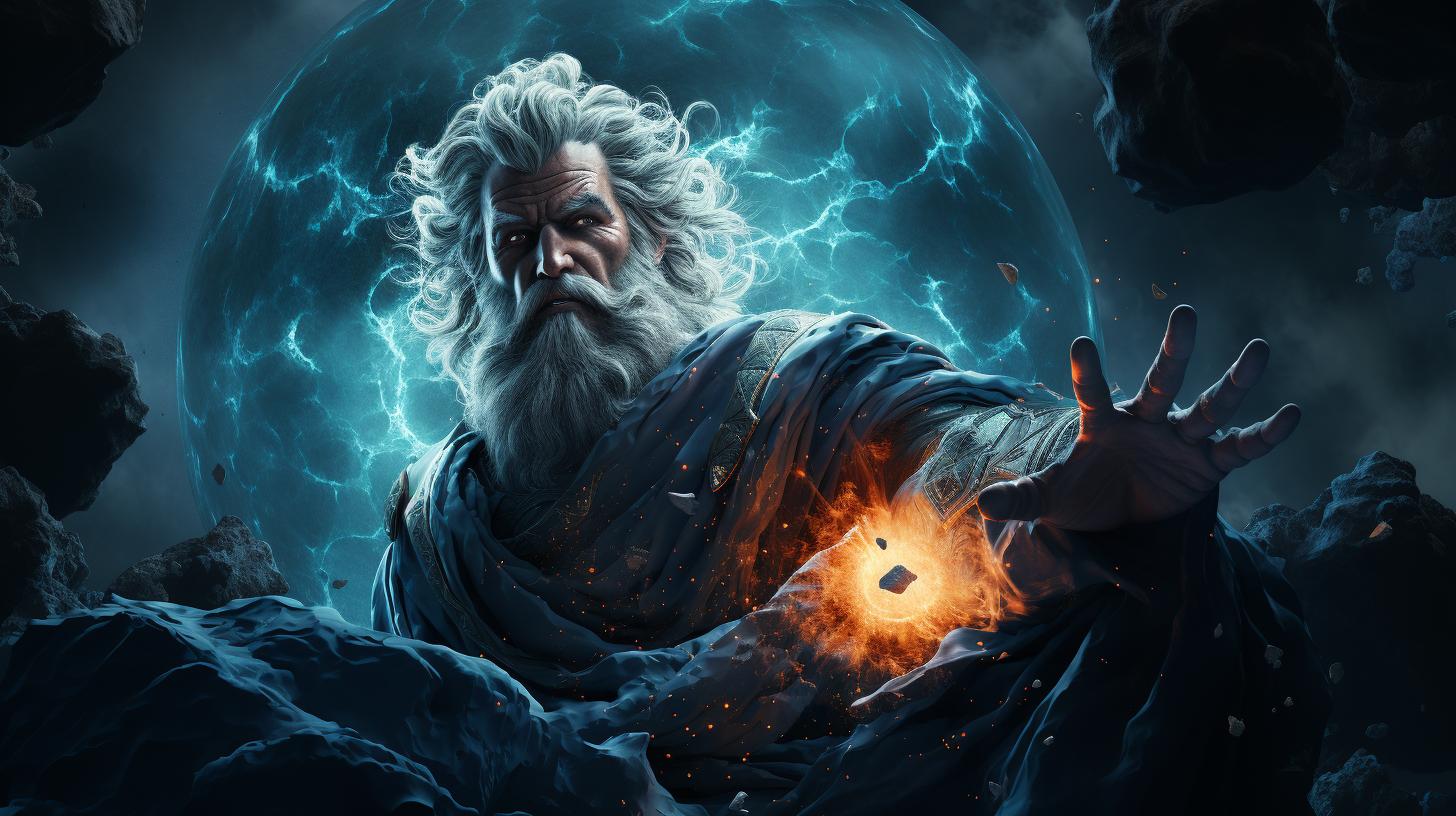Prometheus: The Fire Bringer of Greek Mythology

The myth of Prometheus revolves around his act of stealing fire from the gods, defying their authority. As a punishment, Zeus condemned him to be forever chained to a rock, enduring the perpetual torment of having his liver eaten by an eagle.
However, Zeus eventually agreed to release Prometheus in exchange for information about a prophecy. This act of defiance and subsequent liberation left a lasting impact on humanity, who created rings to commemorate Prometheus’ help.
Throughout history, Prometheus’ story has been celebrated in art, literature, and mythology, exploring his motives and significance in Greek cosmology.
The Myth of Prometheus and the Theft of Fire
The myth of Prometheus holds a significant place in Greek mythology, recounting the tale of a Titan who defied the gods and stole fire to bestow upon humanity. Known for his cunning and intelligence, Prometheus saw the struggle of humanity and their lack of progress due to their reliance on natural elements.
In an audacious act of rebellion, Prometheus ascended to Mount Olympus, the sacred dwelling place of the gods, and stole fire as a means to empower humanity. This daring act, known as Prometheus and the theft of fire, challenged the authority of Zeus and the divine order, setting the stage for a significant shift in the relationship between gods and humans.
Fire, a symbol of knowledge, creativity, and civilization, was inaccessible to mortals until Prometheus took it upon himself to challenge Zeus. By gifting fire to humanity, Prometheus enabled them to survive harsh environments, protect themselves from predators, and lay the foundation for progress and innovation.
This act not only defied Zeus but also symbolized the pursuit of knowledge and the courage to challenge authority for the betterment of humanity.
However, Prometheus’ audacious act did not go unnoticed by Zeus, the ruler of the gods.
To punish Prometheus for his defiance, Zeus ordered him to be bound to a rock and sentenced him to eternal torment. Each day, an eagle would arrive to devour Prometheus’ regenerating liver, causing him immense pain.
This punishment served as a stark reminder of the consequences of defying the gods and the inherent power imbalance between mortals and immortals.
Despite his torment, Prometheus maintained his defiance and resilience.
In time, Zeus relented and agreed to free Prometheus on the condition that he revealed a prophecy, which would aid Zeus in his rule over the cosmos. This liberation marked a turning point in Prometheus’ story, demonstrating the complex dynamics between gods and mortals, as well as the shifting power dynamics within Greek mythology.
The myth of Prometheus has left an indelible mark on Greek culture, influencing various aspects of art, literature, and philosophy. Through his actions, Prometheus stands as a figure embodying the human desire for progress, enlightenment, and emancipation from the limitations imposed upon them, symbolizing the eternal fight for wisdom and freedom.
Prometheus’ Defiance: Stealing Fire from the Gods
This act of audacity represents Prometheus’ rebellion against the all-powerful deities, driven by his compassion for mortals and his desire to uplift them from their primitive state.
The stolen fire, a beacon of enlightenment, knowledge, and technological progress, was Prometheus’s gift to mankind, fundamentally altering their path towards civilization.
However, this audacious act did not go unnoticed by Zeus, the supreme ruler of the gods.
In response to Prometheus’ defiance, Zeus devised a punishment befitting the crime. Prometheus was mercilessly bound to a rock, subjected to an eternity of torment as an eagle continuously devoured his regenerating liver.
This excruciating punishment was meant to serve as a warning to all who dared question the authority of the gods.
Yet, Prometheus’ spirit remained unbroken. Through the passing centuries, his steadfastness caught the attention of Hercules, a hero of both Greeks and Romans, who ultimately released him from his agonizing fate.
However, to forever remind Prometheus of the consequences of his audacity, Zeus forced him to wear an everlasting ring forged from unyielding steel, symbolizing the eternal bond between human aspiration and divine will.
The act of stealing fire from the gods encapsulates the essence of Prometheus’ defiance and his profound love for humanity.
This bold act forever altered the course of human civilization, unleashing a wealth of possibilities and advancements. It represents the eternal struggle for knowledge, innovation, and progress, as mortals strive to rise above their limitations.
Prometheus’ act of defiance resonates throughout the ages, serving as a timeless symbol of human ingenuity and the relentless pursuit of enlightenment. It continues to inspire artists, writers, and thinkers, who explore the moral complexities and societal implications inherent in Prometheus’ audacious endeavor to bring fire to humankind.
The Punishment of Prometheus: Chained to a Rock
After defying the gods and stealing fire for humanity, Prometheus faced a brutal punishment at the hands of Zeus. The mighty ruler of Olympus condemned Prometheus to an eternity of torment, forever chained to a desolate rock.
Bound tightly, Prometheus became a captive to his own audacity, his flesh defenseless against the relentless pecking of an eagle. Each day, the predator would swoop down, tearing at his liver, while the night brought respite from the excruciating pain, only to repeat the cycle once more with the dawn’s arrival.
This savage punishment served as a deliberate reminder to all mortals of the consequences of challenging the divine order. The gods sought to demonstrate their dominance and maintain their authority, bathing their retribution in an aura of fear and awe.
No escape was possible, as the chains that bound him were forged with divine craftsmanship, unyielding to even the strongest mortal attempts at liberation.
Stripped of his freedom, Prometheus’ defiance turned into an eternal burden, a constant reminder of his audacious act and the price he paid for challenging the gods.
This punishment, designed to crush Prometheus’ spirit, instead planted the seeds of sympathy and admiration in the hearts of mortals.
As they witnessed his enduring suffering, people began to question the fairness of the divine rule, pondering the limits of obedience and the potential consequences of rebellion.
Prometheus’ Release: A Bargain with Zeus
After enduring his punishment for what seemed like an eternity, Prometheus found hope in an unexpected turn of events.
Zeus, the ruler of the gods, decided to grant him freedom, but not without a price. In a daring negotiation, Prometheus revealed a prophetic secret known only to him, a secret that Zeus coveted.
By exchanging this valuable information, Prometheus struck a deal to secure his release from the torment that had plagued him for so long. In his enduring wisdom, Prometheus knew that the key to his liberation lied in offering something of immense significance to Zeus, a deal that even the king of gods could not resist.
As the chains that bound Prometheus were finally loosened, he emerged from his shackles with a newfound sense of purpose. Free from the eternal torment, Prometheus left behind a legacy that would forever be remembered by humanity.
The anointed ring, symbolizing the divine gift of fire, became a cherished emblem of Prometheus’ defiance and liberation.
The Symbolism of the Prometheus Ring
The Prometheus ring holds deep symbolism as it serves as a tangible reminder of the heroic act of stealing fire from the gods. Crafted by human hands, these rings embody the gratitude and reverence towards Prometheus for his selfless act of bestowing fire upon humanity.
Worn by individuals who seek to honor Prometheus, these rings symbolize the courage to challenge authority and the desire for progress and enlightenment. They represent a connection to the Promethean spirit, inspiring wearers to strive for greatness and push the boundaries of knowledge and creativity.
Through their intricate designs, Prometheus rings often depict elements associated with fire and wisdom. Flames, intertwined with ancient symbols of knowledge and inspiration, are commonly etched onto their surface. These intricate patterns mirror the complexities of the human quest for enlightenment.
The wearing of Prometheus rings has become a statement of solidarity amongst those who value the power of independent thinking and intellectual curiosity. It is a testament to the enduring legacy of Prometheus and his influence on humanity’s pursuit of knowledge and advancement.
- The Prometheus ring represents:
- Resilience and defiance against oppression
- Humanity’s ability to challenge and surpass limitations
- The pursuit of knowledge and wisdom
- A connection to the Promethean spirit of progress and enlightenment
- The importance of independent thinking and intellectual curiosity
- By wearing the Prometheus ring, individuals:
- Pay homage to the enduring legacy of Prometheus
- Declare their commitment to personal growth and self-improvement
- Promote the values of intellectual curiosity and pursuit of knowledge
- Embrace the Promethean spirit of pushing boundaries and seeking progress
As wearers proudly display their Prometheus rings, they serve as a constant reminder of the transformative power of knowledge, the importance of embracing innovation, and the courage to challenge established norms and beliefs.
Promethean Themes in Greek Mythology
In Greek mythology, the story of Prometheus and his theft of fire from the gods is rich with profound themes that continue to captivate our imagination. The Promethean themes intricately woven throughout Greek mythology offer us insights into the human condition, our relationship with the gods, and the eternal struggle between mortals and immortals.
One of the central themes explored in the myth of Prometheus is the defiance of divine authority. Prometheus daringly challenges the power of the gods by stealing fire, an act that symbolizes the acquisition of knowledge and enlightenment for humanity.
This act of rebellion highlights the innate human desire for progress, advancements, and autonomy.
Another prominent theme in the myth is the concept of sacrifice. Prometheus willingly endures immense suffering for the sake of humanity, facing a cruel punishment at the hands of Zeus. This selfless act of sacrifice embodies the idea that progress and innovation often come at a great cost.
The enduring symbol of the Prometheus Ring serves as a reminder of humanity’s debt to this defiant Titan. The ring represents the eternal flame of knowledge and the power to challenge divine authority.
It also symbolizes the resilience and indomitability of the human spirit in the face of oppression.
In Greek mythology, Prometheus is not merely a rebel figure, but also a creator.
He is credited with bringing arts, sciences, and other cultural achievements to mankind. This theme highlights the transformative power of knowledge and the profound impact it has on human civilization.
Furthermore, the punishment inflicted upon Prometheus by Zeus and his eventual release by Hércules emphasizes the dynamic relationship between mortals and the divine.
It explores the complexities of divine justice, mercy, and the potential for redemption.
The Promethean themes in Greek mythology continue to resonate with us today, inviting us to ponder the nature of defiance, sacrifice, progress, and the pursuit of knowledge.
The enduring legacy of Prometheus and his stolen fire serves as a timeless reminder of the human spirit’s capacity for ingenuity and unwavering determination in the face of adversity.
Prometheus in Art and Literature
Prometheus’ daring act of stealing fire from the gods has inspired countless artists and writers throughout history.
His story has been portrayed in various forms of art and literature, offering different interpretations and perspectives. Let’s explore how Prometheus has been depicted in these creative works.
Artistic Representations
Prometheus’ defiance and his role as the bringer of fire have been captured in numerous paintings and sculptures. Artists have depicted him bound to the rock, enduring his eternal punishment while also emphasizing his determination and defiance.
These artworks often highlight the dramatic moment of Prometheus’ act of theft, symbolizing his sacrifice for the sake of humanity.
Literary Works
Prometheus’ story has also been a subject of fascination for writers and poets. From ancient Greek playwrights such as Aeschylus to modern authors like Mary Shelley, his character and actions have been explored in depth.
In Aeschylus’ play “Prometheus Bound,” the Titan’s suffering and his refusal to submit to Zeus’s authority are analyzed. Mary Shelley’s novel “Frankenstein” draws upon the Prometheus myth, with Victor Frankenstein’s relentless pursuit of knowledge paralleling Prometheus’ defiance of the gods.
Symbolism and Themes
The Prometheus myth has become a rich source of symbolism in art and literature. His act of stealing fire is often seen as a metaphor for the acquisition of knowledge and the advancement of civilization.
Prometheus’ rebellion against the gods raises profound questions about the balance between power and humanity, the consequences of defying authority, and the ethical implications of scientific progress. These thematic explorations continue to resonate with readers and viewers alike, provoking contemplation and introspection.
Continued Influence
Prometheus’ enduring presence in art and literature speaks to the timeless significance of his story. His mythological character has served as a catalyst for artistic expression, inspiring creators to delve into the complexities of human nature, the pursuit of knowledge, and the boundaries of societal norms.
As we continue to grapple with ethical dilemmas and the consequences of our actions, Prometheus remains an influential figure whose story encourages us to question, reflect, and strive for progress.
Exploring Prometheus’ Role in the Creation of Humanity
Prometheus, the legendary figure from Greek mythology, played a significant role in the creation of humanity. According to the myth, Prometheus molded human beings out of clay and gave them the gift of fire, which he stole from the gods.
This act of compassion and empowerment marked the turning point in the development of civilization.
By bestowing fire upon humanity, Prometheus not only ignited the sparks of progress but also sparked the birth of arts, sciences, and technological advancement.
Fire became the symbol of knowledge, enlightenment, and innovation, allowing humans to thrive and conquer new frontiers.
The Gift of Fire: Catalyst for Change
With the gift of fire, Prometheus empowered humanity to explore the wonders of the world. Fire fueled their ambitions, allowing them to cook food, forge tools, and create warmth and light.
This newfound resource enabled human beings to survive and adapt in harsh environments, leading to the growth of civilizations and the exchange of ideas.
Furthermore, fire acted as a catalyst for progress, enabling humans to refine metals, develop agriculture, and enhance their overall quality of life.
The Promethean flame symbolized the transformative power of knowledge, driving humanity to constantly seek improvement and push the boundaries of their existence.
Prometheus’ Sacrifice: Paving the Path for Mortals
Prometheus’ act of stealing fire had profound consequences. He willingly defied the gods, risking their wrath, to bring enlightenment to humanity. In doing so, he suffered a harsh punishment, chained to a rock as his liver was repeatedly devoured by an eagle.
Despite his eternal torment, Prometheus’ sacrifice highlighted the resilience and unwavering spirit of human beings. It demonstrated their capacity to challenge the status quo, defy adversity, and strive for a better future.
Prometheus became a symbol of heroism, representing the unyielding human spirit and unshakable determination.
Legacy and Reverence
The story of Prometheus and the gift of fire has left an indelible mark on human history and culture. His defiance, sacrifice, and subsequent liberation have inspired countless artists, writers, and thinkers throughout the ages.
From ancient Greek plays, such as Aeschylus’ ‘Prometheus Bound,’ to modern interpretations in literature and art, Prometheus continues to captivate our imagination. His story serves as a timeless reminder of the power of altruism, the thirst for knowledge, and the enduring spirit of humanity.
Even today, the Prometheus ring acts as a symbol of gratitude and homage to the titan who dared to challenge the gods. It serves as a constant reminder of the transformative power of knowledge, and the responsibility that comes with its acquisition.
In conclusion, Prometheus’ role in the creation of humanity was instrumental in shaping the course of civilization. His act of stealing fire symbolized the empowerment of mortals and the birth of progress, inspiring generations to question, innovate, and strive for a better future.
The Promethean legacy remains deeply ingrained in human culture, serving as a reminder of our capacity for defiance, sacrifice, and boundless potential.
Prometheus and the Clash of Gods: Zeus’ Wrath
The theft of fire by Prometheus did not go unnoticed by Zeus, the king of the gods.
Zeus was enraged by Prometheus’ act of defiance, as it diminished the power and control of the gods over mankind. In response to Prometheus’ theft, Zeus unleashed his wrath upon him, devising a punishment befitting his audacity.
Zeus ordered that Prometheus be bound to a rock on Mount Caucasus, where an eagle would visit him every day to devour his liver. This torment was to be eternal, with Prometheus’ liver regenerating each night only to be torn out again the next day.
The excruciating pain inflicted upon Prometheus served as a constant reminder of his disobedience and the consequences of challenging the authority of the gods.
However, it is important to note that Zeus eventually changed his stance and agreed to free Prometheus.
This change of heart was not simply an act of kindness from Zeus; it was prompted by Prometheus’ knowledge of a vital prophecy that concerned Zeus himself. Prometheus, being the wise and cunning titan that he was, saw an opportunity to secure his freedom by offering this valuable information to Zeus.
Although the exact details of the prophecy are not provided, it is clear that Prometheus possessed knowledge that was crucial to Zeus’ plans and ambitions.
In exchange for his freedom, Prometheus revealed this prophecy to Zeus, ultimately leading to his release from his eternal torment.
The clash between Prometheus and Zeus symbolizes the struggle for power and control, as well as the defiance of mortal beings against divine authority.
It is a testament to the indomitable spirit of Prometheus and his unwavering commitment to humanity’s well-being, even in the face of severe punishment.
The Legacy of Prometheus’ Fire: Impact on Human Civilization
The act of Prometheus stealing fire from the gods had a profound and lasting impact on human civilization.
This single act of defiance and liberation sparked a fundamental change in the course of human history, empowering mankind with newfound knowledge and possibilities.
By gifting fire to humanity, Prometheus bestowed upon us the ability to cook food, enabling better nutrition and improved digestion.
This advancement led to healthier and stronger individuals, fostering the growth of human populations and enhancing our ability to thrive.
Additionally, the gift of fire ignited the spark of intellectual curiosity within mankind.
It represented the dawning of enlightenment, paving the way for the development of arts, sciences, and technology. The fire acted as a symbol of inspiration, fueling creativity, innovation, and progress.
Furthermore, this stolen fire allowed humans to harness its power for various purposes.
It enabled us to forge tools and weapons, enhancing our productivity and defense capabilities. Fire also played a crucial role in the advancement of metallurgy, allowing the refinement of metals essential for construction and industry.
The legacy of Prometheus’ fire is not just confined to practical applications. It holds profound symbolic significance as well. The act of stealing fire represents the audacity to challenge authority and transgress boundaries.
It signifies the human spirit of rebellion, seeking to overcome limitations and unlock hidden potentials.
Moreover, the act of stealing fire from the gods exemplifies the indomitable spirit of human resilience in the face of adversity.
Prometheus’ defiance and sacrifice in bringing this divine gift to humanity embody the values of selflessness and sacrifice for the greater good.
Throughout history, this myth has resonated with countless cultures and civilizations, inspiring narratives, artwork, and philosophical contemplation.
Prometheus’ act of stealing fire serves as a cautionary tale about the consequences of rebellion and the pursuit of forbidden knowledge, urging us to consider ethical implications and the responsibility that comes with wielding such power.
The impact of Prometheus’ fire continues to shape our world today. It reminds us of the transformative potential within each individual and the capacity to bring about positive change. The legacy of Prometheus’ fire serves as a reminder that with great knowledge and power comes the responsibility to use them for the betterment of humanity.
Prometheus and the Trojan War: Myths and Legends
The mythological figure of Prometheus has a significant association with the legendary Trojan War, as depicted in various myths and legends. While the majority of sources primarily focus on his role in stealing fire from the gods, Prometheus finds his place within the narrative of the Trojan War through indirect connections between the gods and mortals.
In Greek mythology, the Trojan War was a monumental conflict between the Greeks and the Trojans. The war was sparked by the abduction of Helen, the wife of Menelaus, King of Sparta, by Paris, a prince of Troy.
The gods played an influential role in the outcome of this epic war, with their allegiances and interventions largely shaping the fate of the warriors.
In some versions of the myth, Prometheus is credited as the creator or instigator of the Trojan horse, a pivotal element in the fall of Troy.
According to the myth, the Greeks presented a large wooden horse to the Trojans as a gift, secretly concealing a select group of Greek warriors inside. The Trojans, unaware of the Greek soldiers hidden within, brought the horse into their city walls, which ultimately led to the downfall of Troy.
While no direct connection is often drawn between Prometheus and the Trojan horse in classical texts, some interpretations and retellings have attributed its creation to his cunning or influence. This association represents the enduring nature of Prometheus’ presence in Greek mythology and the broader cultural resonance of his actions.
Furthermore, Prometheus’ role in the Trojan War extends beyond the realm of physical warfare. As a symbol of rebellion against divine authority, he embodies the themes of defiance and human autonomy.
These themes resonate in the mortal heroes and leaders who participated in the Trojan War, such as Achilles, Odysseus, and Agamemnon, who also challenged the gods and faced their own consequences.
In summary, while Prometheus’ direct involvement in the Trojan War may not be explicitly depicted in classical texts, his presence and symbolism permeate the epic through indirect connections and shared themes.
The myth of Prometheus intersects with the legendary conflict, bringing an added layer of depth and significance to the narrative of the Trojan War.
Prometheus Bound: Aeschylus’ Play and its Significance
Aeschylus’ play Prometheus Bound is a dramatic portrayal of the mythological figure Prometheus and his eternal torment.
In this tragedy, we witness Prometheus being chained to a rock as punishment for stealing fire from the gods and gifting it to humanity. This play, believed to have been written in the 5th century BCE, delves deep into the consequences of Prometheus’ actions and sheds light on the complex relationship between mortals and gods.
Prometheus Bound not only showcases the suffering of Prometheus but also explores the themes of rebellion against divine authority and the power of knowledge. Through vivid imagery and powerful dialogues, Aeschylus brings forth the struggles and conflicts faced by Prometheus as he defies the supreme rule of Zeus.
The significance of Prometheus Bound lies in its exploration of human nature, ambition, and the quest for freedom.
Prometheus, in this play, is depicted as a symbol of intellectual rebellion and defiance against oppression. His act of stealing fire becomes a metaphorical representation of the acquisition of knowledge and enlightenment that empowers humanity.
Aeschylus’ masterful storytelling not only captivates the audience but also sparks contemplation about the role of gods and mortals in the grand design of the universe. The play raises profound questions about the limits of human ambition, the consequences of challenging divine authority, and the everlasting struggle between mortals and gods.
Prometheus Bound continues to resonate with audiences even after centuries due to its timeless themes and thought-provoking ideas. It serves as a reminder of the power of defiance, the pursuit of knowledge, and the enduring spirit of Prometheus, who sacrificed his own well-being for the betterment of humanity.
The Titan Prometheus and His Contributions to Humanity
Prometheus, the Titan of Greek mythology, played a significant role in shaping the destiny of humanity through his invaluable contributions. Despite his act of stealing fire from the gods leading to severe consequences, his actions brought immeasurable benefits to mortals.
Prometheus bestowed upon humanity the gift of fire, a remarkable force that fueled progress and innovation. The stolen fire became a symbol of knowledge, enlightenment, and civilization, enabling humans to survive harsh environments, stay warm, cook food, and illuminate darkness.
Fire became a catalyst for advancements in technology, agriculture, and industry.
Beyond the mere gift of fire, Prometheus bestowed numerous other talents and abilities upon mankind. He is regarded as the creator of humanity, fashioning the first humans out of clay and breathing life into them.
Prometheus nurtured and guided human development, teaching them various arts and sciences, such as agriculture, medicine, mathematics, astronomy, and metallurgy.
With his rebellious act against the divine order, Prometheus championed the independence and progress of mortals.
He defied the gods and their monopoly over knowledge, seeking to empower humanity with newfound skills and potential. His actions challenged the status quo and inspired humans to strive for greatness and overcome their limitations.
Prometheus’ contributions to humanity are not limited to tangible gifts. His story and the symbolism behind his actions have sparked creative endeavors in art, literature, and philosophy throughout history. Writers, poets, and artists have drawn inspiration from Prometheus’ defiance, his quest for knowledge, and his enduring punishment, bringing his tale to life in various forms of expression.
The legacy of Prometheus’s contributions endures to this day, shaping our world and inspiring future generations. His actions exemplify the enduring human spirit to challenge, question, and progress. The fire he bestowed upon humanity continues to ignite the flames of innovation, enlightenment, and intellectual curiosity.
While Prometheus’ act of stealing fire had profound consequences for him personally, his contributions to humanity remain a testament to the courage, resilience, and vision that fuels human progress. As we reflect upon his story, we are reminded of the human potential that lies within each of us and the transformative power of knowledge and enlightenment.
Discovering Prometheus in Ancient Greek Texts
In ancient Greek texts, Prometheus emerges as a prominent figure, imparting his significance in the realm of mythology and the human understanding of divine acts. These texts provide valuable insights into the character of Prometheus and shed light on the motivations behind his audacious act of stealing fire from the gods.
One such influential account is found in Hesiod’s Theogony, where Prometheus is portrayed as a cunning and resourceful deity who outsmarts Zeus, the supreme god, by tricking him during the division of sacrificial offerings.
This episode establishes Prometheus as a symbol of craftiness and intelligence.
In Prometheus Bound by Aeschylus, a tragically poetic drama, we witness Prometheus enduring his punishment while engaging in profound conversations with various characters.
Through these dialogues, we gain deeper insights into his role as the champion of humanity and the source of human civilization’s progress.
Another noteworthy mention is in the works of the ancient poet Pindar, particularly his Pythian Odes, where Prometheus receives recognition as the benefactor of humanity.
These texts highlight his role as the giver of fire, bringing enlightenment, technological advancement, and the arts to humankind.
Furthermore, the epic poem Theogony by Hesiod describes Prometheus as the creator of humanity, fashioning mortals out of clay while instilling them with divine intelligence.
This act of creation further exemplifies Prometheus’ unique connection to humanity and emphasizes his important contributions.
Ancient Greek texts not only explore Prometheus’ actions but also delve into the repercussions of his defiance.
They depict Zeus’ wrath and his relentless pursuit to assert his dominance over the Titan. These texts capture the elemental clash between mortals and immortals and underscore the enduring struggle between Prometheus and the ruling deities.
Through the meticulous study and interpretation of these ancient Greek texts, we gain a deeper understanding of Prometheus’ motives and the profound impact of his theft of fire. These stories help us discover the essence of Prometheus as a rebel, a creator, and a symbol of humanity’s enduring quest for knowledge and progress.
Prometheus and the Gods: Struggles and Conflicts
The myth of Prometheus showcases the profound struggles and conflicts that existed between Prometheus and the gods. As one of the Titans and a champion of humanity, Prometheus sought to challenge the authority and power of the divine beings.
In Prometheus’ act of stealing fire from the gods and giving it to humanity, he directly defied the wishes of Zeus and the other ruling gods. This act of defiance sparked a fierce conflict between Prometheus and the gods, as it threatened to disrupt the established order and upset the balance of power.
The gods, particularly Zeus, viewed Prometheus’ actions as a direct challenge to their authority and control over mortals. They sought to punish Prometheus severely for his disobedience and to assert their dominance over humanity.
As a result, Zeus ordered Prometheus to be bound to a rock and condemned him to endure eternal torment, wherein a relentless eagle would relentlessly devour his regenerating liver day after day.
This punishment served as a constant reminder both to Prometheus and to mortals of the immense power and wrath of the gods.
The struggles and conflicts between Prometheus and the gods reflect the larger theme of the clash between mortals and immortals in Greek mythology.
Prometheus, as a benefactor of humanity, symbolized the potential for human advancement and progress, while the gods represented the existing order and divine authority.
Despite the intense conflicts, Prometheus’ act of defiance also held a deeper meaning.
It symbolized the human desire for knowledge, innovation, and the pursuit of a better life. By stealing fire, Prometheus bestowed upon humanity the transformative power to create and to challenge the existing boundaries set by the gods.
The struggles and conflicts between Prometheus and the gods have been a subject of interpretation and exploration in various art forms and literature throughout history. This enduring myth continues to captivate and resonate with audiences, reminding us of the complexities of the human spirit and our ever-present desire to push against limitations and embrace our own destiny.
Promethean Fire in Modern Interpretations
Throughout history, the myth of Prometheus and his theft of fire has been a source of inspiration for countless interpretations in various artistic mediums, including literature, film, and visual arts. These modern interpretations often explore the underlying themes and symbolism associated with Prometheus and his act of defiance.
In literature, authors have reimagined the Promethean fire as a metaphor for knowledge, enlightenment, and human progress. It is frequently portrayed as a catalyst for societal advancements, scientific discoveries, and technological innovations.
The fire stolen by Prometheus is seen as a representation of the human thirst for knowledge and the desire to challenge the established order.
In film and visual arts, Prometheus is often portrayed as a heroic figure with a rebellious spirit.
His act of stealing fire becomes a symbol of individualism, bravery, and the quest for freedom. These adaptations often emphasize the conflict between mortals and immortals, highlighting the struggle for autonomy and self-determination.
Furthermore, modern interpretations of Promethean fire delve into the ethical implications of Prometheus’ actions. They raise philosophical questions about the boundaries of knowledge, the pursuit of power, and the responsibility that comes with wielding such power.
These interpretations explore the moral complexities of Prometheus’ act, offering different perspectives on whether it was a righteous act of compassion or a reckless act of hubris.
In contemporary contexts, the symbolism of Prometheus and his stolen fire continues to resonate.
It serves as a reminder of the human potential for innovation, creativity, and intellectual growth. The Promethean fire becomes a symbol of human resilience, adaptability, and the relentless pursuit of progress.
In conclusion, modern interpretations of Promethean fire in various artistic mediums provide a platform for exploring the enduring significance of Prometheus’ act and its relevance to contemporary society. These interpretations symbolize the indomitable spirit of humanity, our eternal quest for knowledge, and our innate desire to challenge the established norms.
Prometheus and Athena: A Mythological Connection
Prometheus and Athena, the goddess of wisdom, share a unique connection in Greek mythology. While Prometheus is often associated with his act of stealing fire from the gods, Athena’s role in this particular narrative is significant as well.
Athena, known for her intelligence and strategic prowess, played a pivotal part in Prometheus’ story. It is believed that she recognized the potential of fire and its immense value for the progress of humanity.
Being a goddess closely associated with civilization and knowledge, Athena understood the significance of Prometheus’ act and supported his endeavor to empower mortals.
Although not explicitly depicted in all versions of the myth, some sources highlight Athena’s involvement in helping Prometheus carry out his daring theft.
Whether through her guidance or simply her silent approval, Athena’s presence underscores the shared vision she and Prometheus had for advancing humanity.
Furthermore, Athena’s close association with craftsmanship and technology resonates with Prometheus’ contributions in the realm of arts and sciences.
Both figures embody the spirit of innovation and enlightenment, seeking to elevate human existence through their respective domains.
While Prometheus stole fire to liberate humanity and grant them the ability to create, it is believed that Athena, as the patron goddess of various crafts, provided inspiration and guidance for mortals to utilize this newfound power wisely.
Overall, the mythological connection between Prometheus and Athena showcases the synergy between wisdom, innovation, and the pursuit of progress. It reminds us of the importance of intellect and strategic thinking in propelling human civilization forward, as exemplified by these powerful and influential figures in Greek mythology.
Prometheus and the Legends of Hera
The myth of Prometheus is intricately intertwined with the powerful figure of Hera, the queen of the gods in Greek mythology. While Prometheus is often portrayed as a rebellious titan who defies Zeus, his actions also have significant implications for Hera and the wider pantheon.
In the legends of Hera, Prometheus’ theft of fire plays a pivotal role in shaping her relationship with the mortal world.
Hera, known as the goddess of marriage and childbirth, is a complex deity whose wrath is legendary.
She is often depicted as a jealous and vengeful figure, particularly in response to her husband Zeus’ numerous infidelities. Prometheus, as the cunning titan who defies the gods, became a source of fascination and potential threat to Hera.
While Hera is not directly involved in the story of Prometheus stealing fire, her reaction to this act of defiance is significant.
The fire stolen by Prometheus represents not only a physical element but also a symbol of knowledge, progress, and civilization. This knowledge provided by fire empowers mortals and challenges the authority of the gods.
For Hera, this represents a clash of values and power dynamics. Fire, obtained through Prometheus’ audacious act, enables humanity to advance, explore new territories, and challenge the gods’ supremacy. Hera, as a divinity associated with tradition and order, is bound to feel threatened by such developments that give mortals newfound freedom and agency.
The legends of Hera and Prometheus intersect in their shared concern for control and influence. Hera, a goddess preoccupied with maintaining stability and preserving the existing social order, has a vested interest in reining in Prometheus and his audacious actions.
This clash between Hera and Prometheus creates a dynamic tension within Greek mythology, reflecting the broader tension between innovation and tradition.
While Hera’s direct involvement in the story of Prometheus stealing fire may be limited, her association with the status quo and her determination to maintain her position of power make her a significant figure in understanding the repercussions of Prometheus’ act.
The legends of Hera and Prometheus shed light on the complex power dynamics within the Greek pantheon, the clash between mortal and immortal realms, and the consequences of challenging divine authority.
Prometheus’ Plight: The Eternal Torment of the Eagle
The myth of Prometheus tells the tale of his audacious act of stealing fire from the gods and giving it to humanity. For this act of defiance against Zeus and the divine order, Prometheus was condemned to an eternal torment.
Bound to a rock, Prometheus endured the perpetual agony of having his liver pecked out by an eagle. Each day, the eagle would relentlessly feast upon his liver, only for it to regenerate overnight, subjecting Prometheus to the same excruciating torment day after day.
This punishment inflicted upon Prometheus by Zeus showcases the extent of the god’s wrath and retribution. The eternal torment of the eagle tearing out Prometheus’ liver serves as a poignant reminder of the consequences of challenging the divine authority.
The cruelty of Prometheus’ punishment symbolizes his unwavering commitment to humanity. Despite the immense suffering he endured, Prometheus never wavered in his dedication to the betterment of mankind. His selflessness in stealing fire from the gods echoes his deep empathy and compassion towards humanity’s struggles.
The eternal torment inflicted upon Prometheus is a symbolic representation of the price he paid for his audacity. It underscores the magnitude of the divine punishment, immortalizing his sacrifice and serving as a cautionary tale for those who dare to challenge the gods.
In various literature and art forms, Prometheus’ plight has been portrayed to evoke empathy and admiration for his unwavering defiance in the face of merciless punishment. The enduring image of the eagle pecking at his liver has become a powerful symbol of resilience, endurance, and the indomitable spirit of Prometheus.
The eternal torment of the eagle serves as a poignant reminder of the consequences of defying the gods, highlighting the boundless power of Zeus and the price one must pay for rebellion.
Prometheus’ suffering stands as a testament to his unwavering determination and his eternal place in mythology.
Understanding Prometheus’ Motives for Stealing Fire
Delving into the myth of Prometheus, we encounter the enigmatic question of why he dared to steal fire from the gods. To comprehend Prometheus’ motives, we must explore the context and symbolism surrounding this act.
Prometheus, as the creator of humanity and the giver of arts and sciences, possessed a profound empathy for mortal beings. In his wisdom, he recognized that the divine gift of fire would immensely benefit humankind.
Fire represented not only warmth and light but also the catalyst for progress and civilization.
It is crucial to acknowledge that Prometheus’ actions were driven by compassion rather than mere rebellion. His desire to uplift humanity and empower them with the transformative power of fire embodies a selfless dedication to the well-being and advancement of mortals.
By bestowing the sacred flame upon humanity, Prometheus aimed to bridge the gap between the gods and humans, seeking to improve their lives and endow them with the potential for growth.
This act of benevolence signals Prometheus’ unwavering belief in the potential of mortals to reach greater heights.
Moreover, Prometheus’ theft of fire symbolizes a profound reflection on the nature of power and knowledge.
His act challenged the gods’ monopoly over these fundamental elements, highlighting the importance of independence and intellectual freedom. Prometheus recognized that withholding fire’s transformative power from humanity would condemn them to a stagnant existence, devoid of progress and enlightenment.
Ultimately, understanding Prometheus’ motives for stealing fire allows us to appreciate the depth and complexity of his character. His defiance against the gods was not a mere act of rebellion but rather an act of compassion, driven by a genuine desire to empower the human race.
It is a testament to his unwavering belief in the potential of mortals and to challenge the boundaries imposed by the divine.
Interpretations of Prometheus’ Act: A Moral Dilemma
The act of Prometheus stealing fire from the gods has long been a subject of moral contemplation and philosophical discourse. It presents a fascinating dilemma that raises questions about the boundaries of human ambition and the pursuit of knowledge.
One interpretation of Prometheus’ act is that it embodies the idea of challenging authority for the betterment of humanity. By disobeying Zeus and giving fire to mankind, Prometheus demonstrated a rebellious spirit and a belief in the potential of human progress.
This viewpoint sees his act as a heroic defiance against oppressive divine rule.
On the other hand, some interpret Prometheus’ act as a hubristic trespassing of divine boundaries. They argue that Prometheus arrogantly overstepped his role by stealing fire, an essential element that belongs to the realm of the gods.
From this perspective, Prometheus is seen as a symbol of dangerous ambition and the consequences of defying established hierarchies.
Furthermore, Prometheus’ act can be seen as a metaphor for the pursuit of knowledge and technological advancement.
The gift of fire represents the acquisition of knowledge, invention, and innovation, which can bring both progress and destruction. This interpretation highlights the ethical implications of scientific and technological breakthroughs, underscoring the responsibility that comes with wielding great power.
Additionally, the moral dilemma surrounding Prometheus’ act raises questions about sacrifice and the greater good. By stealing fire, Prometheus knowingly subjected himself to eternal torment and punishment to benefit humanity. This selfless act invites reflection on the lengths one would go to uplift others and the ethical dilemmas that arise when personal sacrifice clashes with societal benefit.
Overall, the interpretation of Prometheus’ act as a moral dilemma encompasses a wide range of philosophical and ethical considerations. It invites us to critically examine the complexities of human nature, defiance, ambition, knowledge, sacrifice, and the consequences of challenging existing norms and authority.
Prometheus through the Ages: Evolution of his Character
Throughout history, the character of Prometheus has evolved and taken on different interpretations. From his early portrayal as the rebellious Titan who stole fire from the gods to his role as a symbol of human enlightenment, Prometheus represents a complex figure with multifaceted implications.
In ancient Greek mythology, Prometheus was revered as a wise and cunning figure who defied the oppressive rule of the gods. His act of stealing fire and gifting it to humanity was seen as an act of benevolence, as it allowed humans to thrive and progress.
However, it also incurred the wrath of Zeus, resulting in Prometheus’ eternal torment.
As time went on, Prometheus became a symbol of human intellect and progress. In the Renaissance period, he was often associated with the concept of Promethean fire, which represented the creative and transformative powers of human ingenuity.
Artists and writers were inspired by Prometheus, depicting him as a champion of human potential and individuality.
- In literature, Prometheus inspired countless works, such as Mary Shelley’s “Frankenstein,” where the unbridled pursuit of knowledge and power mirrors the Titan’s defiance.
- In art, Prometheus has been portrayed in various forms, from statues and paintings to theatrical productions, capturing his eternal struggle and profound impact on human civilization.
- In philosophy, Prometheus symbolizes the enduring quest for human autonomy and the pursuit of truth, challenging traditional systems and sparking intellectual revolutions.
Prometheus’ character has transcended time and culture, finding resonance in different eras and societies.
His transformation from a mere mythological figure to a symbol of progress and human potential is a testament to the enduring power of his story.
In modern times, the character of Prometheus continues to captivate our imagination. His story reflects the eternal struggle between authority and liberation, conformity and individuality. As we ponder the question of why Prometheus stole fire, we delve deeper into the complexities of human nature and the quest for knowledge, often at great personal risk.
The Parallels between Prometheus and Other Mythological Figures
Within Greek mythology, Prometheus shares notable similarities with various other mythological figures, shedding light on common themes and archetypes prevalent in ancient Greek storytelling.
- Prometheus and Hercules: Both Prometheus and Hercules are central figures in Greek mythology who defied the gods and experienced immense suffering as a result.
While Prometheus challenged Zeus by stealing fire, Hercules defied the gods through his renowned Twelve Labors. The parallels between their acts of rebellion and their subsequent punishments illustrate the complex relationship between mortals and deities.
- Prometheus and Pandora: Prometheus and Pandora are linked through the story of Pandora’s Box.
As the creator of Pandora and the one who bestowed her with curiosity, Prometheus played a pivotal role in introducing suffering and hope to humanity. This connection showcases the interconnectedness between the actions of different mythological figures and their impact on human existence.
- Prometheus and Zeus: Zeus, the king of the gods, and Prometheus share a multifaceted relationship.
While Prometheus infuriated Zeus with his act of stealing fire, he also facilitated Zeus’ eventual release from a prophecy’s grips. Their dynamic represents the intricate power struggles and negotiations within the divine realm.
- Prometheus and Epimetheus: Prometheus’ brother Epimetheus, meaning “afterthought,” serves as a foil to Prometheus.
While Prometheus possesses foresight and intellect, Epimetheus exhibits impulsive decision-making. Their contrasting characteristics highlight the importance of balance and careful consideration in mortal and divine interactions.
By comparing Prometheus to these other mythological figures, we can discern recurring motifs such as defiance, suffering, and the intricate relationships between gods and mortals.
These parallels deepen our understanding of Prometheus’ significance within the tapestry of Greek mythology, as well as the broader themes explored in ancient Greek storytelling.
The Significance of Prometheus’ Theft of Fire in Greek Cosmology
The mythological tale of Prometheus’ theft of fire holds immense significance in Greek cosmology.
This act symbolizes the pivotal role played by Prometheus in shaping humanity and facilitating its progress. By stealing fire from the gods and gifting it to mortals, Prometheus granted them the power of illumination, innovation, and civilization.
Fire, in ancient Greece, represented not only physical warmth and light but also knowledge, enlightenment, and human progress. It enabled early humans to survive, thrive, and expand their horizons. Prometheus’ act of defiance against the gods was an act of benevolence towards humanity, as it elevated them from a primitive state to one characterized by intellectual growth and enlightenment.
The theft of fire became the catalyst for the development of various arts, sciences, and technologies. It enabled humans to harness the power of fire for cooking, metallurgy, and other essential practices.
It kindled the spark of curiosity and creativity within individuals, pushing them to explore and create new ideas, inventions, and cultural advancements.
Furthermore, Prometheus’ act challenged the authority of the gods and emphasized human agency and self-determination.
It showcased the potential for mortals to rise above their limitations and chart their own destiny. This resonated deeply within the ancient Greek society, as it encouraged individualism, critical thinking, and the pursuit of knowledge.
Prometheus’ theft of fire represented a significant shift in the dynamics between gods and mortals. It mirrored the ongoing struggle for power and autonomy within human society, as well as the eternal conflict between tradition and progress.
This mythological event became a metaphorical lesson, encouraging individuals to question authority, challenge norms, and strive for personal and societal growth.
The significant impact of Prometheus’ theft of fire resonates throughout ancient Greek texts, art, and literature.
It serves as a reminder of the transformative power of knowledge, the importance of human ingenuity, and the enduring quest for enlightenment. The myth of Prometheus continues to capture the imagination of countless generations, inspiring them to embrace the Promethean spirit of progress, innovation, and the pursuit of truth.
Prometheus and the Titans: Their Relationships and Interactions
The myth of Prometheus is intricately connected with the Titans, a powerful race of divine beings who ruled the cosmos before the reign of the Olympian gods. Prometheus himself is a Titan, known for his cunning and intelligence.
As such, his interactions with the other Titans shaped the course of Greek mythology.
One of the most notable relationships Prometheus had with the Titans was his sibling bond with Epimetheus.
Epimetheus, whose name means “afterthought,” was known for his impulsive nature and lack of foresight. Their contrasting personalities often led to conflicts and dilemmas in their interactions.
- Prometheus, being the more strategic and forward-thinking of the two, often had to come to Epimetheus’ aid and find solutions to the problems caused by his brother’s hasty decisions.
- Additionally, their relationship played a significant role in the theft of fire from the gods.
It was Prometheus who devised the plan to acquire fire for the benefit of mankind, while Epimetheus supported his brother’s audacious act.
Furthermore, Prometheus’ relationship with the Titan Atlas also had its impact.
Atlas, known for bearing the weight of the heavens on his shoulders, was approached by Prometheus during his quest to steal fire. Seeking assistance, Prometheus convinced Atlas to retrieve the fire from the gods’ domain, allowing him to fulfill his mission for the betterment of humanity.
Additionally, Prometheus’ defiance and actions against the gods were not isolated from the other Titans. His act of stealing fire ignited a spark of rebellion among the Titan faction, leading to a clash between the Titans and the Olympians, ultimately resulting in the Titanomachy – a fierce battle for control of the cosmos.
Throughout Greek mythology, the interactions between Prometheus and the Titans serve as a catalyst for change, showcasing the complex dynamics between divine beings and shedding light on the struggle for power and independence.
Promethean Teachings: Lessons for Humanity
Prometheus, the legendary figure who defied the gods to steal fire for mankind, has left behind valuable teachings that resonate with humanity even today. His act of bringing fire from the heavens symbolizes the acquisition of knowledge and enlightenment.
Through his actions, Prometheus exemplifies the pursuit of progress, the quest for freedom, and the power of individuality.
One of the key lessons we can learn from Prometheus is the importance of challenging the status quo.
By daring to confront the divine order, Prometheus encourages us to question authority and strive for a more equitable world. His act serves as a reminder that progress often requires breaking away from tradition and embracing change.
Another lesson embodied by Prometheus is the significance of sacrifice. Despite knowing the consequences, he willingly endures eternal torment for the betterment of humanity. This selflessness teaches us the value of empathy, compassion, and the willingness to endure hardships for a greater cause.
Prometheus also epitomizes the power of knowledge and intellectual growth. By bestowing fire upon humanity, he bestowed upon us the ability to cultivate arts, sciences, and civilization itself. He encourages us to seek wisdom, expand our minds, and use our newfound knowledge for the betterment of society.
Furthermore, Prometheus reminds us of the need to stand up against injustice and oppression. His rebellion against Zeus represents the defiance against tyrannical rule and the fight for freedom and equality.
His story inspires us to challenge oppressive systems, fight for justice, and champion the rights of the marginalized.
- Challenge the status quo and question authority.
- Embrace change and break away from tradition for progress.
- Value empathy, compassion, and the willingness to sacrifice for others.
- Seek knowledge, intellectual growth, and use it for the betterment of society.
- Stand up against injustice and fight for freedom and equality.
The teachings of Prometheus continue to resonate throughout history, shaping our perspectives and inspiring us to strive for a more enlightened and just world.
They remind us of the power within ourselves to challenge norms, embrace wisdom, and forge our own paths. Prometheus’ legacy serves as a timeless lesson for humanity, reminding us of our capacity to make a difference and ignite positive change.
Prometheus’ Cultural and Historical Impact
Prometheus’ act of stealing fire from the gods and giving it to humanity had a profound cultural and historical impact, shaping various aspects of human civilization throughout history. Here are some key points regarding the influence of Prometheus:
- Revolutionizing Knowledge: Prometheus’ theft of fire symbolizes the acquisition of knowledge and the advancement of human understanding.
This act represents the pursuit of enlightenment, innovation, and progress.
- Champion of Humanity: Prometheus is revered as a champion and benefactor of humanity, defying the gods to empower mankind. His selfless act portrays a sense of empathy, compassion, and rebellion against oppressive forces.
- Inspiration for Art and Literature: Prometheus’ tale has inspired countless works of art, literature, and music.
From Aeschylus’ play “Prometheus Bound” to Mary Shelley’s novel “Frankenstein,” his mythological significance captivates creatives to explore themes of human nature, rebellion, and the consequences of defying authority.
- Symbolic Importance: The Prometheus myth serves as a metaphorical framework for examining various philosophical, ethical, and existential questions.
It exemplifies the tension between individual freedom and societal norms, the pursuit of knowledge, and the responsibilities that come with it.
- Scientific Endeavors: Prometheus’ role as a divine figure associated with the advancement of humanity also resonates in scientific pursuits.
His story serves as an inspiration for scientific explorations, technological advancements, and the quest for understanding the universe.
- Political and Social Symbolism: Prometheus’ rebellion against the gods can be interpreted as a symbol of resistance against authoritarian rule and the fight for individual liberties.
His story has been embraced by various social movements throughout history, advocating for justice, equality, and human rights.
Prometheus, the fire-stealing god, continues to ignite our imagination, inviting us to question established norms, push boundaries, and strive for a better future.
His cultural and historical impact resonates not only in ancient Greek mythology but permeates through the fabric of human existence, leaving an indelible mark on our collective consciousness.
Unveiling the Secrets of Prometheus’ Fire: Myth and Reality
As we dive deeper into the myth of Prometheus, one aspect that captivates our attention is the concept of fire stolen from the gods.
This act of defiance has sparked curiosity and speculation regarding its true meaning and significance in both myth and reality.
Throughout history, fire has been a powerful symbol representing knowledge, innovation, and enlightenment.
Prometheus’ audacious act of stealing fire from the gods can be interpreted as the acquisition of divine wisdom and the birth of civilization. By gifting fire to humanity, Prometheus bestowed upon us the power to survive, create, and progress.
However, delving into the realities of mythology, we must acknowledge the intricacies and complexities intertwined with the myth of Prometheus. While the tale serves as a metaphor for mankind’s pursuit of knowledge and advancement, it also highlights the consequences of challenging divine authority.
The eternal torment inflicted upon Prometheus, being chained to a rock while an eagle devours his liver day after day, demonstrates the price paid for his defiance. This punishment serves as a cautionary tale, reminding us that pushing boundaries or seeking divine power can have dire consequences.
Nevertheless, myths often transcend their initial narratives, resonating with universal truths. With Prometheus’ theft of fire, we see an everlasting message of the human spirit’s relentless pursuit of progress, even in the face of adversity and punishment.
It is through Prometheus’ act of stealing fire that we uncover deeper insights into the human condition and our unyielding thirst for knowledge. The myth not only explores the consequences of overstepping boundaries but also raises questions about the nature of power, the dynamics between gods and mortals, and the eternal quest for enlightenment.
As we peel back the layers of this captivating myth, we are presented with an opportunity to reflect on the essence of humanity and the constant struggle for growth and understanding.
Prometheus’ act serves as a reminder of the sacrifices made and the price paid for progress, making it an enduring tale that continues to resonate throughout the ages.
Prometheus and the Conflict between Mortals and Immortals
One of the central themes in the myth of Prometheus is the conflict between mortals and immortals.
Prometheus, as a Titan who stood with humanity, played a crucial role in bridging the gap between gods and humans.
Throughout the myth, we see Prometheus defying the gods by stealing fire and sharing it with mortals.
This act of compassion and empowerment for humanity created a rift between Prometheus and the gods, especially Zeus, who viewed it as a challenge to their authority.
The conflict between mortals and immortals is heightened by the punishment inflicted upon Prometheus for his actions.
Chained to a rock, he endured the constant torment of having his liver devoured by an eagle, a fate meant to remind both mortals and immortals of the consequences of disrupting the natural order.
Despite the conflict, Prometheus’ defiance sparks a struggle for freedom and independence. The fire he stole represents not only technological advancement but also knowledge and enlightenment. By bringing this divine gift to mortals, Prometheus empowers them to challenge the divine hierarchy and strive for progress.
This clash between mortals and immortals also reflects a broader human desire to overcome limitations and challenge the powers that be. It symbolizes the eternal struggle for autonomy and the pursuit of a better future.
Throughout history, this conflict has manifested in various forms, from societal rebellions to political revolutions. The story of Prometheus serves as a reminder of the ongoing tension between those in power and those seeking liberation, a conflict that continues to shape human history.
.




















